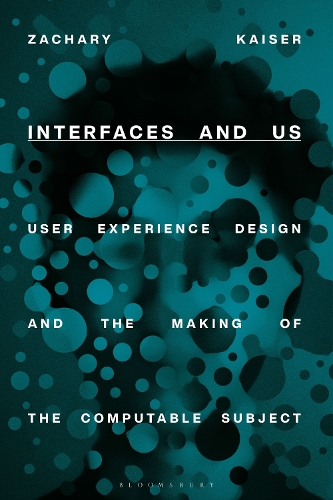
Interfaces and Us: User Experience Design and the Making of the Computable Subject
(Paperback)
Available Formats
Publishing Details
Interfaces and Us: User Experience Design and the Making of the Computable Subject
By (Author) Zachary Kaiser
Bloomsbury Publishing PLC
Bloomsbury Visual Arts
6th April 2023
United Kingdom
Classifications
Tertiary Education
Non Fiction
Graphic design
Ethics and moral philosophy
User interface design and usability
303.4833
Physical Properties
Paperback
224
Width 158mm, Height 232mm, Spine 12mm
440g
Description
Were all familiar with smart TVs making suggestions on our future watching, real-world exercise data being transferred into stats and infographics on our workout apps and turning up our home heating before we start our commute but how does this world of technological interfaces affect our actions and perceptions of selfWhen society relies on computer models and their interfaces to explain and predict everything from love to geopolitical conflicts, our own behaviour and choices are artificially changed. Zachary Kaiser explores the harmful social consequences of this idea - balanced against speed and ease for the user - and how design practice and education can respond positively. - Concepts of freedom vs convenience - Smart objects and manipulation - Real world information transformed into data - Technologys decisions made on our behalf
Reviews
Zach Kaiser's Interfaces and Us dares to peel back the plastic film protecting interface design to reveal how it is both shapes and is shaped by everything from convenience and consumerism to market forces and economic inequality. While finally putting to rest the idea that design is inherently neutral, it's an indispensable guide to the politics of how we interface not just with the digital systems around us, but with late capitalism itself. -- Tim Maughan, author of Infinite Detail, Canada
Interfaces and Us blends theory, art, activism and pedagogy into a cogent story about the making of selves and societies. This incisive text will be an inflection point for design education. -- Jenny L. Davis, School of Sociology, The Australian National University
Author Bio
Zachary Kaiser is Associate Professor of Graphic Design and Experience Architecture at Michigan State University, USA. His research and creative practice examine the politics of technology and the role of design in shaping the parameters of individual, social, and political possibility. His work has been featured in national and international exhibitions, and his writing, on topics ranging from the future of the arts in higher education to dream-reading technologies, appears in both scholarly and popular publications.
